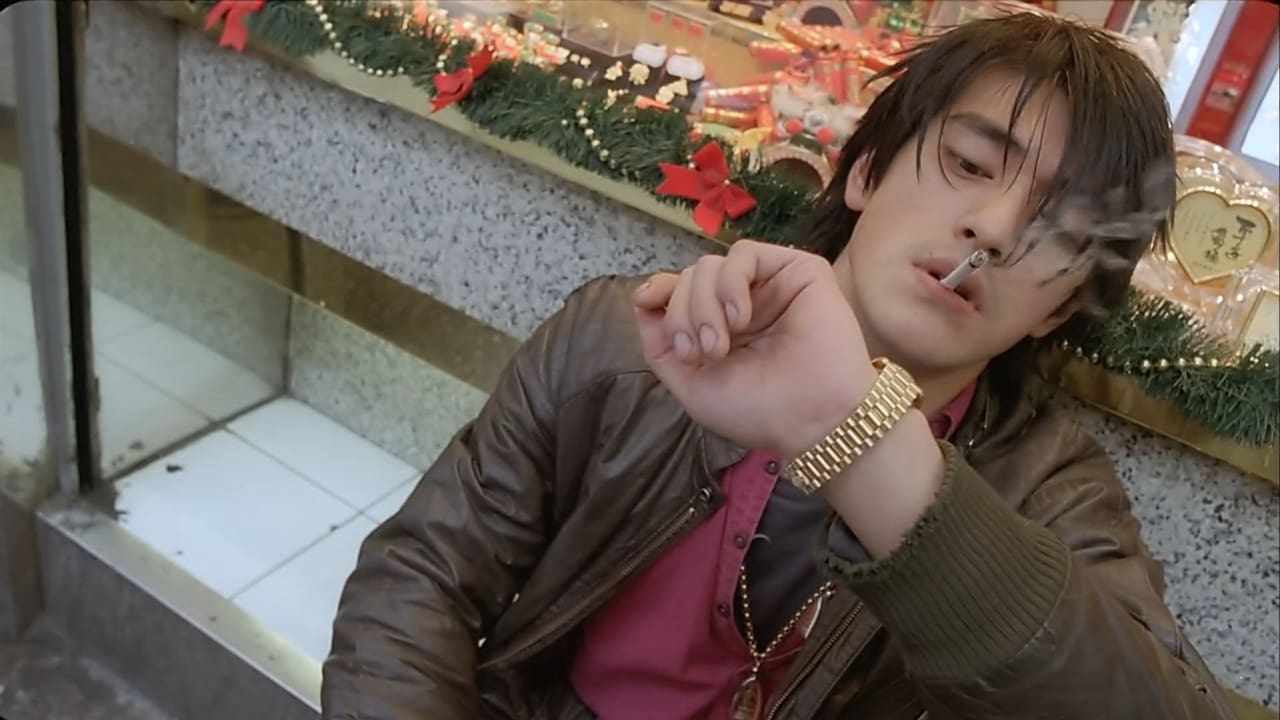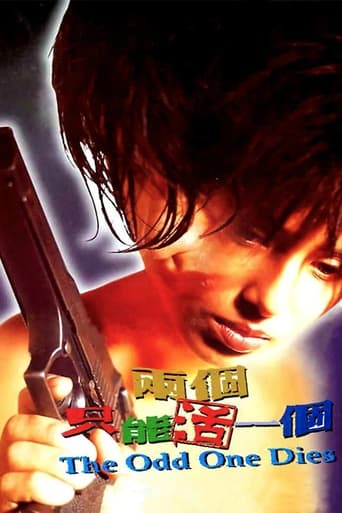

Who payed the critics
... View MorePlot so thin, it passes unnoticed.
... View MoreGreat Film overall
... View MoreThe movie turns out to be a little better than the average. Starting from a romantic formula often seen in the cinema, it ends in the most predictable (and somewhat bland) way.
... View MoreAnalogous to Expect The Unexpected (1998) and The Longest Nite (1998) Patrick Yau is the nominal director in The Odd One Dies but did not do the majority of directing (though Yau has stated of those three films he had the most input with this one). The uncredited director is Johnnie To, whose production company is Milkyway Image with Wai Ka-Fai, that was the force behind the film. Aside from those three films (which I have seen) Patrick was credited to one more film The Loser's Club (2001; which I have not seen) and apparently his film career has been over since then. However, when watching the movie it is easy to see many familiar elements of To including genre (shashou pian: professional killer genre), incorporation of black humor and Lam Suet.Takeshi Kaneshiro is a laconic street thug called Mo who is either on a death wish or just does not care. I see a bit of this character in Louis Koo's performance in Throw Down (2004), but when you watch this it is hard not to think of Takeshi's two previous Wong Kar-wai* roles (Chungking Express (1994), Fallen Angels (1995)) as well. Takashi after losing much money in gambling decides to take on a hired killer role for 88,000 HK dollars cash. First he gets himself an old large mobile phone, sunglasses, chain, watch, used car with a capricious bumper and a jacket. How he gets those items is quite hilarious. Since he is hell-bent, or just does not care, he gambles a good portion of that money away as well. He loses thousands after thousands, doubling his bet every time with a local card shark named George (Lee Diy-yue), without as much as a wince when he loses. But then the strangest thing happens, he starts to win and he wins big. Then he decides to hire someone else to do the killing.The newly hired killer is, much to his surprise, a female (Carman Lee) who is just out of jail from a previous man-slaughter case (she killed her cousin for her boyfriend/Uncle Simon (singer Ken Choi Fung-Wa); though I am not sure if I am correct -- I believe she killed the infant she had with him when she was 14) and she is just as laconic and nuts as he is. They both smoke quite a lot and almost appear to be Doppelganger's of each other.** However, she is malodorous and unkempt. They, of course, become attached to each other. Now what is he going to do about the hit? I had a lot of fun watching this movie. I had so much merriment that I did the rare thing and watched it twice within a week which I had not done with another film in years. There is a peculiar comedic style to this that is dark, but still quite bloody good (literally). This includes a recurring fingers dismemberment joke when the Triad character Tony (Korean actor Byun Woo-min) catches a knife from both Takeshi and later Carman is brutally hilarious but also leads to a strong scene of redemption at the end. The direction is also quite quirky. You get a great look of Hong Kong in this film which is another trademark of many of Johnnie To's work. There is an excellent scene of Takeshi running around a busy area crossing one street after another. He is almost hit several times and it is great to see the passerby expression (many of these movies will be filmed with many people not knowing they are being filmed). All filmed with no or very few cuts. In fact it is quite reminiscent to a similar scene in Police Story 2 (1988).I really wish these early Milkyway films like this one, The Longest Nite (1998) and The Mission (1999) would get more recognition especially amongst more mainstream critics who tend to eschew anything Hong Kong that is not Wong Kar-wai. This has been slowly changing over the years with Stephen Teo's book on Johnnie To as well as David Bordwell adding a section on To in his updated Planet Hong Kong (online only). But as a fan of these movies such as this one it still is not enough. * Johnnie To has stated that in an interview with Stephen Teo: "we didn't deliberately set out to copy Wong Kar-wai. I don't copy other people's stuff. The film is about loneliness and it's possible that it shows a tendency to Wong Kar-wai." Interestingly enough Stephen Teo does make note of several similarities between Wong's films and this movie in his book Director in Action (2007). My own personal opinion is that the biggest similarity is Takeshi Kaneshiro's performance. While some have stated the cinematography resembles Wong's work, I feel it is just because of the use of hand-held and overuse of canted angles. The issue of expiring time is familiar but I feel that is prevalent of Hong Kong cinema as a whole since the handover was to happen a little over a month after the release of this film. Plus one of the strongest thematic elements for Wong's oeuvre the ever-present "unrequited love" is missing from this film.** The Doppelganger is another recurrent theme in To's films as well as the use of motifs. When watching this movie look for a massive amount of scenarios repeated for a second time or third time. The last time the scenario happens it signals a change. For example, when Takeshi meets Simon for the second time he beats him up. When Carmen sees him she fantasizes about killing him, but leaves him without doing anything. When Takeshi tries to stab the Triad member for the third time (Carmen did it the second time), he does not go through with the motion to remove his fingers and ultimately receives the forgiveness of him. There are many more throughout the film sometimes with the Doppelganger taking the place of the protagonist.
... View MoreThis movie really surprised me. Maybe it's the quirky title, but I really know that Takeshi Kaneshiro is great in this one. His non-verbal acting is so expressive as the guy who says so much without speaking one word. Whether it's the blackjack game, getting beat(!) in mahjong, negotiating for a magnum, or his discussion with a hotel manager, Mo's facial expression shows he means business, but also displays a funny, even tender side. There are so times I was laughing out loud which only a handful of recent films have done. Then, there are some dark, serious scenes and even a touching romantic side to it. It is definitely great viewing and a good way to introduce yourself to Takeshi Kaneshiro, epitome of "cool". Then, try Fallen Angels if you like what you see.
... View MorePart of the new wave of Hong Kong productions, very modern and unique.Takeshi Kaneshiro's best movie persona is that of the lovable loser. (e.g., ANNA MAGDALENA, CHUNGKING EXPRESS) He begins the movie as a completely hopeless and messed up loner who's foolish enough to be beaten and thrown out of a bar, and then goes back in for more beating. You just want to give him a hug.Carman Lee is the same sort, looking bruised and makeup-less throughout most of the movie, but still beautiful. She needs a hug, too. Doesn't take a genius to figure out that these two orphan-like people end up clinging to each other.The ending is heart-rending - so much is told without words. It had me clutching my chest with both my hands.Also, the music is great. Xylophones reminiscent of TWIN PEAKS, and a wacky samba beat is played over a tragi-comic scene in which a gang desperately scrambles to find ice to put their boss's severed fingers in. It's just absolutely cool.Some violent scenes (aforementioned beating, creative finger-slicing) and a lot of character-building with visual elements. Pre-coital grooming rituals include clipping their nails, and the lovers try on each other's clothes and give each other bad haircuts. Yup, it's that sort of a movie.
... View MoreI saw this movie at last year's Fant-Asia film festival in Montreal and it was easily one of the most enjoyable films of the festival.I had seen Takeshi Kaneshiro in other films (Chungking Express,Dr. Wai and the Scripture Without Words, etc.) but this is the film that turned me into a true fan. If you don't know this man's work, you should.
... View More